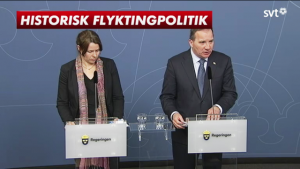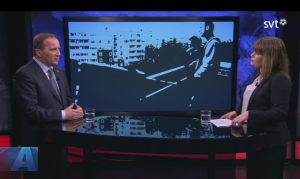By Jonathan Michael Feldman, November 25, 2015, Modified November 26, 2015.
Party Leaders Valorize the Politics of Scarcity
 On Swedish television (SVT) yesterday we saw a series of party leaders speak. One key point was when the Green Party Leader Gustav Fridolin said that Europe must do its duty by taking in more refugees (their fair share), Sweden is ovewhelmed and so Sweden must do less. In response, the Left Party leader Jonas Sjöstedt said that we should not assume the rest of Europe will do its duty and other countries may use Sweden as an excuse to do less. The other key point was when the Prime Minister Stefan Löfven said, we can’t let the flow of refugees retard the welfare state after which the leader of SD, Jimmy Åkesson, said essentially: “we have been saying that for a long time.”
On Swedish television (SVT) yesterday we saw a series of party leaders speak. One key point was when the Green Party Leader Gustav Fridolin said that Europe must do its duty by taking in more refugees (their fair share), Sweden is ovewhelmed and so Sweden must do less. In response, the Left Party leader Jonas Sjöstedt said that we should not assume the rest of Europe will do its duty and other countries may use Sweden as an excuse to do less. The other key point was when the Prime Minister Stefan Löfven said, we can’t let the flow of refugees retard the welfare state after which the leader of SD, Jimmy Åkesson, said essentially: “we have been saying that for a long time.”
Basically none of the parties has a very good idea about how to overcome the politics of scarcity. This politics is defined by resource scarcities which appear to pit one important social objective against another. A moral crisis (the refugees who face potential death) is met with moral arguments (that it should not be so) or economic arguments about what is not possible. We do not see very creative budget proposals (or few alternative proposals tied to even fewer fiscal and economic policy and integration reforms). The reigning policy is to do less and do better by doing less. Each party appears to be more or less logical when they say the current system cannot sustain the immigrant integration infrastructure at present. Yet, almost no one has any comprehensive alternative budget proposals except perhaps Pavlos Cavelier Bizas. He has argued that the money used to buy Christmas presents could be used to pay for absorbing and integrating refugees. The basic idea is that Swedes spend more money on Christmas shopping than in receiving refugees. Given the current state of ideas, this proposal was one of the most important suggestions that any public figure has made. It responded to the real moral crisis and presented an alternative to Europe’s repeat of its earlier moral failures in the 1930s and 1940s. Part of this failure was a rejection of Jewish refugees by communities hostile to refugees. This could be seen in the Evian Conference.
Consumption Morality
 Of course, it was a proposal that met resistance, particularly by economists of a certain variety. Sven-Olov Daunfeldt, a professor of economics and director of research at HUI Research, thinks that it can be problematic to set these numbers against each other. He was quoted in Metro as follows: “I can understand that the link made in these times, but you have to think a few steps further.” Daunfeldt believes that Swedish wealth is influenced by the level of consumption. He argued: “Should private consumption will decrease drastically in Sweden, we would of course have a reduced growth and even less resources to finance public activities.” So, again we have an argument against the politics of scarcity met by an argument supporting scarcity politics.
Of course, it was a proposal that met resistance, particularly by economists of a certain variety. Sven-Olov Daunfeldt, a professor of economics and director of research at HUI Research, thinks that it can be problematic to set these numbers against each other. He was quoted in Metro as follows: “I can understand that the link made in these times, but you have to think a few steps further.” Daunfeldt believes that Swedish wealth is influenced by the level of consumption. He argued: “Should private consumption will decrease drastically in Sweden, we would of course have a reduced growth and even less resources to finance public activities.” So, again we have an argument against the politics of scarcity met by an argument supporting scarcity politics.
It goes without saying that money spent for food, housing and support services for immigrants is a form of consumption, albeit by the state. Of course, private consumption of Christmas presents generates tax revenues to support public consumption. Even so public consumption for refugees using private vendors will put some wealth into the hands of private suppliers and thereby potentially generates profit which can be taxed.
Beyond the Politics of Scarcity
 Yet, one could resolve part of the trade off between public spending and private contributions to public spending in several ways. First, we could create a special humanitarian tax on Christmas presents. In effect, when you buy a present for a family member or friend you can also buy a present for a refugee, i.e. their survival. Swedish banks are making billions of crowns in profit and they too could be taxed. It is fair to say that it is within the spirit of Christmas to have such a tax.
Yet, one could resolve part of the trade off between public spending and private contributions to public spending in several ways. First, we could create a special humanitarian tax on Christmas presents. In effect, when you buy a present for a family member or friend you can also buy a present for a refugee, i.e. their survival. Swedish banks are making billions of crowns in profit and they too could be taxed. It is fair to say that it is within the spirit of Christmas to have such a tax.
Second, we could link refugees to one another in providing barter and services by organizing a skills bank and exchange system among the refugees. In one proposal, local government wants “local people and community organisations to be able to register the support and skills they can offer a new skills bank, which will collect information and contact details.” In contrast, I argue that refugees could sell services to the state and individuals to generate a capital pool, e.g. lecturing, cleaning, removing graffiti where local governments fail to do so, and so on. The skills bank can be modeled on the historical practice of the Owenite movement. Robert Owen and the Owenite movement would prove to be one of the most important embodiments of the notion that collectives of workers could organize cooperatively outside the framework of existing managerial relations. Owen called for the establishment of new federations of mixed agricultural and industrial villages. Different models for primitive accumulation to create a new economy arose.
In 1827 “a new bazaar was in being, which acted as a centre for the exchange of products made by unemployed members of London trades…who were put to work on materials bought out of trade union funds” (Thompson, 1968: 788, 791). This bazaar illustrates that the extension of “self-reliance,” or the embryonic version of a workers cooperative complex, is based on trade, i.e. exchange within a given state’s boundaries: “Thus the Equitable Labour Exchanges, founded in London and Birmingham in 1832-3, with their labour notes and exchange of small products, were not conjured out of the air by paranoiac prophets. If we list the products which were brought for exchange to the Co-operative Congress in Liverpool in October 1832 we can also see the people. From Sheffield, cutlery and coffee-pots: from Leicester, stockins and Lace: from Huddersfield, waistcoat pieces and shawls: from Rochdale, flannels” (Thompson, 1968: 791). The rules of a society formed in 1832 in Ripponden illustrate that extension of an alternative economy can be based on the exchange of each worker’s capacities, i.e. labour power, human capital: “by the increase of capital the working classes may better their condition, if they only unite and set their shoulder to the work…we all live by the produce of the land, and exchange labour for labour, which is the object aimed at by all Co-operative Societies” (quoted in Thompson, 1968: 793-794).
Most fascinating about the Owenite movement was that it evolved not out of theoretical propositions but actual working class practice: “the germ of most of Owen’s ideas can be seen in practices which anticipate or occur independently of his writings.” For example, as early as 1796, an attempt was made to create a British Fraternal Society which would employ “its out-of-work members” and would exchange the products of shoemakers, silk weavers, tailors etc. with each other. There are “also a number of instances of pre-Owenite trade unions when on strike, employing their own members and marketing the product” (Thompson, 1968: 790).
Third, we could discuss the trade off between increased military spending and refugee absorption. Here the absorption of refugees are important security moves. The question is why? On the one hand, we have the following argument made by “terrorist experts”: “The problem of terrorist recruitment in Sweden was only worsened by the flow of refugees from Iraq in the aftermath of the 2003 U.S. invasion. Although most refugees were civilians, uninterested in violence, among those who fled to Sweden were jihadi operatives and even leaders of al Qaeda in Iraq, the group that would later spawn the Islamic State. Refugees who had arrived to Sweden before the 2003 invasion would later become leaders within al Qaeda in Iraq…Some of the Iraqi refugees who arrived in Sweden and who had connections to militant groups have since resurfaced in the Syrian civil war as midlevel commanders within the Islamic State and other jihadi factions, such as the Muhajireen Brigade.” In sum, more refugees potentially brings more terrorists according to some applying this logic.
In contrast, we can also see a different kind of logic (although security checks and detailed registration of refugees are necessary to avoid a worse case scenario which would fuel a right-wing backlash against all immigration). According to a report by Laurent Dubrule on November 20, 2015, “all the Paris attackers identified so far were EU nationals,” citing a report in the International Business Times. In fact, French officials suggest that the “the fake passport may have been ‘planted’ by Daesh members, to take advantage of the European refugee crisis.” Moreover, “despite the fact that the Paris attacks, indicate that terrorist threat in the EU can also be reduced with better social cohesion policies, EU policy makers focus entirely on the security issue, and how to improve border controls.”
Some security analysts imply that the fake passport was designed to reduce the flow of refugees. A reduced flow would mean that would be refugees would instead be under the control of ISIS. As Zack Beauchamp noted in Vox: “ISIS despises Syrian refugees: It sees them as traitors to the caliphate. By leaving, they turn their back on the caliphate. ISIS depicts its territory as a paradise, and fleeing refugees expose that as a lie. But if refugees do make it out, ISIS wants them to be treated badly — the more the West treats them with suspicion and fear, the more it supports ISIS’s narrative of a West that is hostile to Muslims and bolsters ISIS’s efforts to recruit from migrant communities in Europe. The fewer refugees the West lets in, and the chillier their welcome on arrival, the better for ISIS.”
Therefore, by reducing refugees Sweden increases the power of ISIS. In contrast, greater security would come by diverting funds from increased military budgets into support for absorption of refugees. In 2014, for example, the Social Democratic party joinined the Moderates and the respectable Right to approve the purchase of 60 new military fighter (JAS) planes produced by Saab Aerospace. One new JAS Gripen fighter plane costs about $43 million according to one estimate. If one multiplies this number by 60 you can get the size of a capital fund which the Social Democratic-respectable Right consensus committed to the new military fighter spending budget. This amount is somewhere on the order of $2.58 billion U.S. dollars. These funds, absorbing public monies (unlike Christmas presents) could have been used to help promote refugee absorption. Military budget cuts can still be used to finance refugee absorption (the Russian threat is belied by many facts ignored by the media, e.g. Russia’s extensive trade with NATO nations or countries militarily allied with the U.S. or NATO itself). Even though some rightwing politicians are convinced that they can use the JAS planes to fight ISIS, it is patently clear that fighter planes could not protect Paris from ISIS attacks. We also know that bombing civilian areas will promote terrorist recruitment efforts.
Conclusions
For various reasons, it is very hard for academics, journalists, policy makers and politicians to combat the politics of scarcity. Academics are often either obsessed with either the logic of the status quo or structural explanations that leave little to the imagination. Journalists do little but create a sounding board for what politicians say and think, with the occasional resort to the first group (yielding of course often very little). When it comes to policy makers, they often lack critical academic knowledge. As for the politicians, they are somewhat hostage to the media framing system.
Have I engaged in a circular argument? I said the media gives a platform to the politicians, but the politicians are limited by the media. How do I resolve this apparent contradiction? Let us look at one example. It makes clear the the military part of the state—by inflating military crises—creates a media space that traps all politicians into a militaristic agenda. During the last submarine crisis, the Swedish media invested over a week in free advertising to the idea that Sweden was suffering from an apparent threat from a foreign power, probably Russia. This advertising campaign helped lead to increased fear and public support for military budget increases and was followed by a parliamentary vote to support such increases. Any politician suggesting that Russia was not a serious threat (even from the Left Party) might suffer a credibility gap. Parties vocally challenging the idea of a Russian threat might lose a lot of votes and influence by taking on an issue at odds with this major advertising campaign. So, giving politicians a platform to speak and say what they choose to say is not necessarily the same as the freedom of politicians to say what they are thinking. Of course, having a series of critical intellectuals point out the absurdity of the advertising campaign might have helped. In contrast, during this campaign we basically got a few media votes in opposition, e.g. a few occasions when Göran Greider spoke against the absurdity of the military advertising campaign. His words, while wise and needed, simply helped legitimate the whole absurd exercise.
The solution to these problems requires a few strategic interventions. I quickly point out only three. First, the Left has to support the creation of a media accountability organization. The need is readily transparent. If academics and intellectuals have alternative budget proposals and plans that are not aired in the media, it is almost as if they do not exist. Having such ideas without the power to project them is somewhat of a useless exercise as C. Wright Mills argued in The Sociological Imagination.
Second, we need a more comprehensive discussion of budgetary tradeoffs. We need to organize public fora to discuss budgets, participatory budget discussions as have been seen in Porto Alegre in Brazil. It is possible to organize such fora in Sweden simply by linking public meetings in a few cities via the Internet. Yet, the Left often prefers a politics and ideology that is obsessed with structures or academic deconstruction. Thus, we see the politics of scarcity repeat itself over and over.
Third, we need social movements to move their money out of institutions that do not support social inclusion, democracy and empowerment and into alternative economic institutions.
References
Magnus Ranstorp, Linus Gustafsson, and Peder Hyllengren, “From Welfare State to the Caliphate,” Foreign Policy, February 23, 2015.
E. P. Thompson, The Making of the English Working Class. New York: Vintage Books, 1996.